Welcome back to Reading the Weird, in which we get girl cooties all over weird fiction, cosmic horror, and Lovecraftiana—from its historical roots through its most recent branches.
This week, we cover Clive Barker’s “In the Hills, the Cities,” first published in Barker’s Books of Blood, Volume 1 in 1984. You can also find it in column favorite anthology The Weird. Spoilers ahead, but go read!
“The shadows of the bodies darkened tracts of land the size of small towns; the weight of their feet trampled the grass to a green milk; their movement killed animals, crushed bushes and threw down trees.”
Mick and Judd are lovers on a European “honeymoon” in Judd’s Volkswagen. In Yugoslavia, dance teacher Mick admits to himself that journalist Judd is a political bigot, an interminable lecturer, and “mind-blowingly boring.” Meanwhile Judd’s discovered what a lightweight Mick is, a “well-groomed nobody” wallowing in “a dreamworld of early Renaissance frescoes and Yugoslavian icons.”
En route to Novi Pazar, the two argue over Mick’s desire to visit yet another monastery. Amidst sun-burnt grain fields, Mick demands Judd pull over. His solution to their intellectual incompatibility is stripping down and sauntering off into the grain. Judd tosses aside anger and caution to follow. Their alfresco sex proves they’re compatible in one way, at least.
***
In Popolac, Vaslav Jelovsek watches the townspeople gather for a once-every-decade ritual. Excitement rises as the complex work of “positioning and buckling and roping” proceeds. Metzinger of Podujevo is Jelovsek’s fellow referee, for today his rival. When the first leg of Popolac leaves the square, “its shadow falling hugely over the face of the Town Hall,” Jelovsek foresees a glorious day, “a golden foretaste of Heaven.”
In Podujevo, sadness tinges the preparations. Nita Obrenovic, their organizer for sixty years, has died; her gentler daughter cannot “coax and bully and inspire the citizens into their places” as Nita did. The confidence of earlier years is lacking. Still, limbs head out of town toward the assembly point.
***
Meanwhile Mick and Judd are motoring down the Ibar valley, where the hills rise “wild and shining on either side.” Gradually the absence of other travelers and seeming abandonment of farmhouses makes them uneasy. They try another road, climbing into the forest-blanketed hills.
***
Popolac and Podujevo are deserted, for even the infirm and aged have gone to the “secret well of the hills, hidden from civilized eyes,” to watch their cities “do ancient and ceremonial battle.” In each town’s embodiment, tens of thousands of hearts beat. The conglomerate giants trample grass, crush bushes and animals, uproot trees. The hills reverberate under their feet. But in Podujevo, technical hitches manifest in an unsteady gait. A bad decade for crops has weakened the competitors and set the scene “for death on an unprecedented scale.”
***
Judd and Mick hear booming too rhymico be thunder, like big guns firing. Clandestine Russian military exercises, maybe, just over the next ridge. Mick wants to turn back, but Judd smells a big story.
Then the screaming starts.
***
On the field of battle, Podujevo totters. A death in its corpus unleashes a chain of chaos, and the flesh-and-blood masterpiece begins to collapse. From its vast “mouth” blasts the wordless howl of ten thousand mouths.
***
Hearing it, Judd’s reminded of the childish terror of Hell that his mother instilled in him. He stops the car, memory-shaken. A tide of blood surges down the dirt road. Mick says flee. Judd says they must look, and drives on.
***
The embodiment of Popolac stares many-eyed at the tangle of bodies and rope that was its ancient rival. Then it flees madly, deeper into the hills. Cresting the ridge, Mick and Judd don’t see the fugitive monster, but ruined Podujevo is enough, a sight too “unspeakably brutal” for their “domesticated imaginations” to fathom. Nearly forty thousand humans, naked or dressed in identical grey, men and women and children, lie in tangles of harness and rope, “as though in some insane collective bondage game.” A man stumbles about shooting fatally wounded survivors. Speaking no English, he can’t answer Mick’s frenzied questions. With his last bullet, he shoots himself.
The lovers can do nothing for Podujevo and retreat from the carnage, arms wrapped around each other. They find Vaslav Jelovsek backing their Volkswagen down the hill—he’s pursuing maddened Popolac. Mick and Judd follow the thief on foot. On the main road, the Volkswagen has overturned in a ditch, tumbling Jelovsek out. Though visibly little injured, he insists in English that he will die. First, though, he unburdens himself of the twin towns’ secret, how for centuries they’ve shaped themselves into giants, always bigger and more complex, each citizen chosen for the task they’re best suited for. Each giant is “the body of the state…the shape of our lives…a miracle.”
Buy the Book
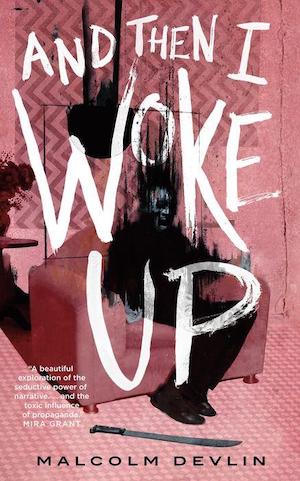

And Then I Woke Up
Jelovsek dies. As Mick and Judd trudge into the twilight, Popolac perishes citizen-cell by citizen-cell, compelled to walk on. Judd struggles for a rational explanation; Mick accepts Jelovsek’s story. They argue but struggle on arm-in-arm.
At last they reach an occupied farmhouse. The wife feeds them; the arthritis-crippled husband ignores them. Mick and Judd fall asleep at the table. By dawn, they’d like to believe, normality will return, bringing disaster-response crews and clean-up operations.
A thunderous tread wakes the old couple. The sight of mad Popolac drives the wife into the forest, casts the husband on the ground. The shaking of the cottage wakes the lovers. Rushing outside, they see against the sky a vast human form, its surface seething as its component citizens strain to keep the titan moving. The old man crawls away. The lovers remain, beyond horror, paralyzed by awe. This sight is “the apex” of their lives. Even if they die, they will have witnessed a miracle.
Popolac crushes the cottage. A dislodged stone strikes Judd, killing him instantly. Mick lunges at a massive leg, snatching harness, rope, hair, flesh. Securing a purchase on the ankle, he becomes a “hitchhiker with a god.” All falls from him, “love and life and sanity,” memory of his name, sex, ambitions.
Popolac walks, “the hum of its voice lost in the night.”
Of Judd remains only “an empty space which he had once filled with breath and opinions,” and he interrupts neither light nor darkness with his name.
What’s Cyclopean: Both giants are presumably cyclopean: “unimaginably huge,” “dwarfing the hills themselves with ambition.” Their smaller details are visceral to the reader if not to the participants, writhing and straining, “flesh-knitted,” the foot a “jigsaw of crushed and bloodied bodies.”
The Degenerate Dutch: Mick thinks Judd is “to the right of Attila the Hun,” while Judd thinks Mick is a “queen” and a “political lightweight.” Meanwhile, the locals dismiss America’s “simple pleasures, its cartoon mice, its candy-coated castles, its cults and its technologies.”
Weirdbuilding: Strange things happen in the hills of eastern Europe.
Libronomicon: “A turning: a palpable turning” is a Hamlet quote. Sort of.
Madness Takes Its Toll: Popolac is gripped by “common insanity” at the death of its rival, a horror that “curdled its brain.” When Judd and Mick drive into its path, they too are “lost to sanity, and to all hope of life.”
Anne’s Commentary
Civic pride and community spirit are great things, right? Except when they go too far, as we saw them do in Shirley Jackson’s “Lottery.” What a quiet story that seems compared to Clive Barker’s “In the Hills, the Cities”—on full visceral display here is his mastery of body horror, extreme yet oddly elegant, mercilessly exercising his readers’ sense-imaginations, their inner eyes in particular. It should come as no surprise that Barker is a painter, illustrator, and comic artist as well as a writer.
He’s also a playwright, screenwriter and film director/producer. As such he could appreciate the toils of a Vaslav Jelovsek and a Nina Obrenovic in organizing a large-scale dramatic presentation, a spectacle to give audiences “a golden foretaste of Heaven.”
Or, as it turns out for the characters of “In the Hills,” a preview of Hell’s “endless, unspeakable torments.”
Safe to say, Barker’s more a Hell than a Heaven guy.
Reading this week’s story, I had a nagging sense I’d seen something like Barker’s human towers before, either on TV or in a dream. How could I not know which? Sometimes one drifts back and forth between the waking world and the Dreamlands barely aware of a transition from the one to the other, as Randolph Carter might tell us if he were as real as the REAL multi-human colossi.
Because human towers are a real thing. I’m not just talking cheerleading pyramids. Not to disparage the athleticism and artistry of those, but have a look at the castells of Catalonia if you don’t mind bruising your dropped jaw on the floor.
The castell was first documented in 1702 but dates back hundreds of years to earlier street dances that featured human pyramids. The 1980s saw a second “golden age” of the castell when women joined in the previously all-male activity, allowing for the construction of higher and higher towers, some nine or ten “stories” (human layers) tall. The base of the castell is most like one of Barker’s body parts, being composed of hundreds of people; unlike Barker’s citizen-cells, however, the base guys need not be experienced castellers. Castellers call making a base fer pinya (making a pinecone). Outside the discipline, the phrase has a broad social connotation of people banding together to accomplish something. Montserrat Rossell Xicola, producer of the film Castells observes that “The human tower is a metaphor for Catalonian identity,” representing togetherness, solidarity, a softening of class differences. “You can step on your boss in a human tower,” Xicola adds. There’s some equality for you.
Barker’s giant-makers go much further into the whole oneness thing. Municipal football teams butting heads aren’t near enough “friendly” competition between their towns. Every capable citizen in Populac and Podujevo participates in the glorious contest by giving over their body as a single cell in the town’s embodiment. I don’t doubt the castellers can achieve a sense of belonging to a single greater entity through their art. Again Barker pushes the idea further. The giant–makers do become a single organism, psychically united by some sort of—what? Mass hypnosis? Absolute empathy? Jelovsek’s “miracle”?
E pluribus unum, out of the many making one, is evidently the ultimate experience in spite of its dangers and tribulations. Mick and Judd’s story parallels that of the towns’ ritual. They are two very different persons, indeed diametrically opposed in their world views and sensibilities. Their relationship seems doomed, and probably ultimately it is. But through the merging of two into one which their really good sex and its afterglow creates, they know something of the city-giants’ bliss; in the fading of that ecstasy and afterglow, they know something of the city-giants’ agony in decaying, in dissolution from oneness into isolation.
Judd dies pretty ignominiously before he can do anything about the so-near passing of a miracle. He probably wouldn’t have done anything but stand there gawking at this, the apex of his experience, too beyond reason to embrace. Romantic Mick does embrace it, literally, fiercely, giving all for a moment’s rapture.
In the swift end, Mick loses everything, “love and life and sanity,” name and sex and ambition. Or—does he give up those things, which is very different from losing them? His last thought is that his individual life and identity “meant nothing. Nothing at all.”
Whereas Judd, choosing nothing, goes “out like a light, a tiny, insignificant light.” Afterwards, when the scavengers have finished with him, he becomes an “empty space,” breath to utter opinions gone, interrupting neither light nor darkness with his name.
Whether or not joining Popolac admits Mick to Heaven, I figure lapsing into a nameless, voiceless, opinionless insignificance must be Hell for Judd.
Ruthanna’s Commentary
Marissa Lingen recently reviewed Kelly Barnhill’s When Women Were Dragons and noted of the central conceit: “This is a metaphor. Also, it isn’t, they really do turn into dragons.” That quote kept popping into my mind as I read this week’s story. This is a metaphor. Also, it isn’t, there really are strapped-together-human juggernauts tramping about the hills of Kosovo.
Some days you just want a really solid metaphor. One that can bleed, and scream, and crush trees and people with its weight.
One of the characters describes these bodies politic as “a living proverb.” Judd suggests that the whole idea is “Trotskyist tripe.” Maybe it’s a little (or a lot) of both. Fascism, etymologically speaking, refers to a bundle of sticks tied together for greater strength. Just in case you missed the point, one of the broken bodies from Podujevo falls in the shape of a swastika.
Clive Barker is not famed for subtlety. He is famed, justly, for blood. And sex, and gritty details that stick in your head. I’m not the only one whose head has gotten stuck. A websearch on the city names shows that Podujevo is a real place (still populated, despite collapsing in a cyclopean accident in the mid-eighties), while Popolac has been turned into a heavy metal song, a custom Magic: The Gathering card, and a lot of really disturbing illustrations.
The metaphor works. Fascism and human-lego giants both subsume the individual into the uncaring collective through a combination of force and seduction, dependent on leaders who are “part prophet and part ringmaster.” Empires and human-lego giants are both “vast and mad and deathless” with “no ambition but to continue until [they cease]”.
Now add one more leg of human motivation, one more way we convince people to sacrifice themselves on the altar of “something bigger.” Looking up those church paintings that Mick never gets to see, I learned from the Encyclopedia Britannica that “the frescoes of the Raska school, in particular, are known for their capacity to blend secular authority with a deep sense of devotion.” Sound familiar? Vaslav comments that in its mix of glory and “stomach-turning sights,” the contest of giants is “a golden foretaste of heaven.”
Readers of cosmic horror already know that divinity is not an unmitigated good—nor, frequently, good or evil in recognizable human terms at all. Judd is amused to consider that he may accidentally destroy innumerable field mice and beetles on his way to a cornfield tryst; the embodied cities trample not only trees and animals but the people who make them up.
At least Cthulhu isn’t made of people. Another possibly-deliberate contrast to “Call of Cthulhu” comes with Judd and Mick’s hope for “all the rites and paraphernalia of a civilized disaster” to make the memories “palatable.” Sometimes we correlate the contents of our minds not to come to unbearable epiphanies, but to smooth out the uncorrelatable complexities of reality into something we can bear to remember.
The desire to join bodies is ordinary—can be creative, pleasurable, even noble. Early in the story Mick and Judd spend a pleasant few minutes “locked together, limb around limb, tongue around tongue, in a knot only orgasm could untie.” But taken to its extreme, all individuality lost, you get the self-immolating miracle that kills Judd outright subsumes Mick’s personhood. Hitchhiking with gods may take you far, but you won’t appreciate the trip.
“Better to go with it wherever it was going, serve it in its purpose, whatever that might be; better to die with it than live without it.” This is a metaphor. And also it isn’t.
Next week, the end of Carmilla, Chapters 15-16, and also probably the end of Carmilla.
Ruthanna Emrys’s A Half-Built Garden comes out July 26th. She is also the author of the Innsmouth Legacy series, including Winter Tide and Deep Roots. Her short story collection, Imperfect Commentaries, is available from Lethe Press. You can find some of her fiction, weird and otherwise, on Tor.com, most recently “The Word of Flesh and Soul.” Ruthanna is online on Twitter and Patreon, and offline in a mysterious manor house with her large, chaotic, multi-species household outside Washington DC.
Anne M. Pillsworth’s short story “The Madonna of the Abattoir” appears on Tor.com. Her young adult Mythos novel, Summoned, is available from Tor Teen along with sequel Fathomless. She lives in Edgewood, a Victorian trolley car suburb of Providence, Rhode Island, uncomfortably near Joseph Curwen’s underground laboratory.










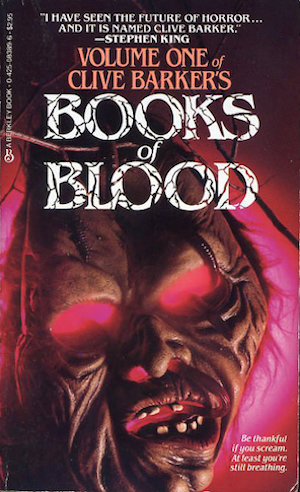
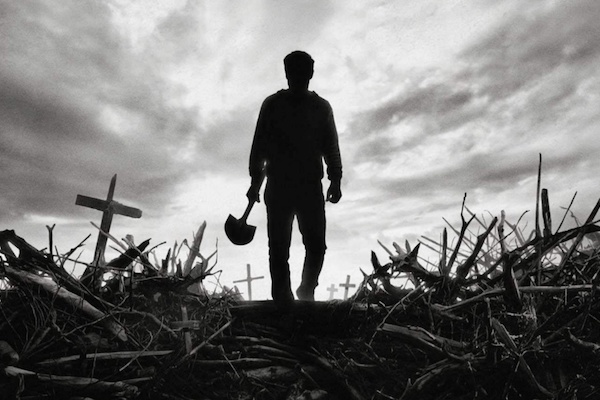
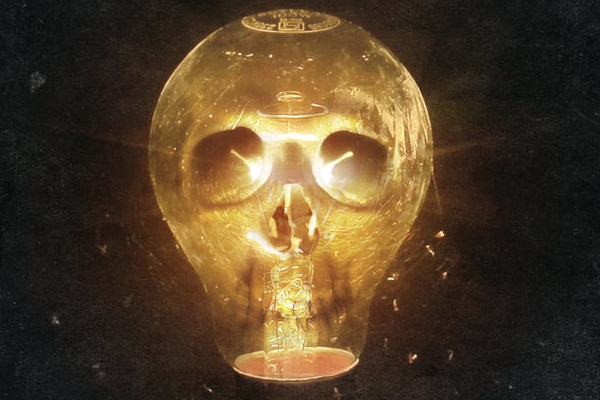
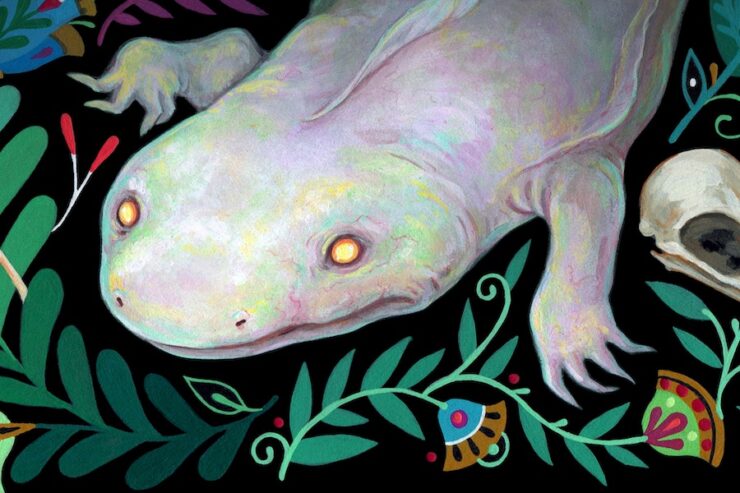
This proto-folk horror story is as shockingly good today as when it was first published. A true masterpiece.
I have a serious Mandela effect going on… I would’ve sworn y’all had done this story before (ca. October 2020, when I borrowed BoB Vol 1 from my library)… but I can’t find it in either the Reading Lovecraft or Reading Weird indexes.
AU Ruthanna and Anne not only covered this story in late 2020, but reminisced about our pre-pandemic research trip to the ruins of Popolac, noting that the Popolac Memorial Fountain is both a masterpiece of modern monument-building and subtly disturbing in its interpretation of the original disaster. Since then, the attached museum has followed in the footsteps of Dracula’s Castle to open a vaccination clinic, afterwards providing novelty bandaids in the shape of a small humanoid figure clinging to one’s upper arm. People do admit to a marked reluctance to remove the bandaid later, but that probably doesn’t reflect anything important.
I read all the Books of Blood in, I think, high school? And I remember having mixed feelings. In retrospect, I think I just wasn’t ready. The sex made me both uncomfortable and purient, and the blood felt like the author (about whom I was totally ignorant at the time) was a total edgelord. 15 or ::mumble mumble:: years on, I’m shook. This is a masterpiece for all the reasons mentioned, and Barker has said volumes on where the body meets politics. Thank you for pulling the caul off my eyes. Time to find another copy and see if I really do remember there being a ghost made of a sheet.
Where the author might be thinking they’ve seen the massive body made of people before – the very Cthulhu-esque creature created by Maitreya in Warren Ellis’ Supergod.
The giant made of people always makes me think of the frontispiece illustration of Hobbe’s Leviathan.
@rickarddavid I’ve definitely recommended this story for a review, so I wonder if you’re remembering one of my comments! Not as exciting as R.E.’s Alternate Universe idea, though.
This was the first Clive Barker story I read. It made quite an impression.
This story works as a vision of the horrors to come in the forthcoming Yugoslavian “civil” wars.